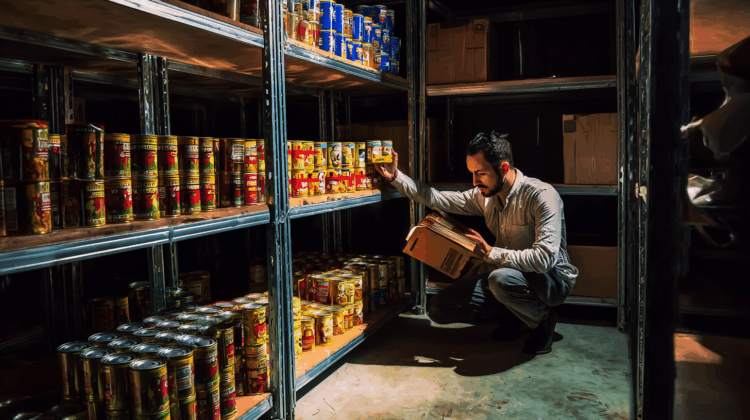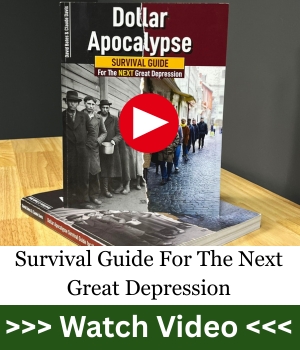Let’s get one thing straight: if you’re not prepping, you’re waiting to be a statistic.
We’ve been fed the lie that everything is under control—that the shelves will always be stocked, the lights will always be on, and someone, somewhere, will always come to save us. But if you’ve paid attention to the last few years—pandemics, blackouts, riots, inflation, political theater—you already know the system is fragile.
The elite? They’re already prepared. Private bunkers, off-grid compounds, insider info.
The rest of us? We’re left with duct tape and hope—unless we act now.
Step 1: Wake Up
Before you stockpile beans or build a bunker, you need to deprogram yourself.
The media wants you pacified. Dependent. They laugh at “preppers” on TV while quietly taking notes from our manuals. Understand this: prepping isn’t paranoia—it’s pattern recognition. You’re not crazy for noticing the cracks. You’re smart for acting on them.
Ask yourself—why do the most powerful people in the world keep buying land in remote areas? Why are billionaires investing in doomsday bunkers while the rest of us are told to “just trust the system”? Because they know collapse isn’t if—it’s when.
If you’re still waiting for permission to start prepping, you’re already behind. This world rewards obedience with fragility. But those who prepare, question, and act independently? They survive. Wake up before the lights go out for good.
Step 2: Threat Assessment – What’s Actually Coming?
Forget the Hollywood nonsense. Your threats aren’t zombies or aliens—it’s the power grid failing. It’s the banks freezing your account. It’s a cyberattack, a supply chain collapse, a sudden martial law declaration.
Make a list:
- What’s most likely to hit your region?
- What’s your current level of dependence on the system?
- Who in your life will slow you down—or help you survive?
The truth is, you won’t prep effectively if you don’t know what’s coming for you. Are you living in a hurricane zone? Earthquake country? Near civil unrest hotspots? Tailor your strategy. A one-size-fits-all approach is lazy and dangerous.
And don’t forget: the real threats often hide in plain sight. Food insecurity isn’t just a third-world issue anymore. Inflation is slow-motion economic warfare. The moment you stop analyzing threats is the moment they get the jump on you.
Step 3: The Rule of 3s (Because Biology Doesn’t Lie)
- 3 minutes without air.
- 3 hours without shelter in extreme conditions.
- 3 days without water.
- 3 weeks without food.
Prepping isn’t about hoarding—it’s about priority.
Ask yourself: if the grid went down right now, could you:
- Filter dirty water?
- Stay warm (or cool)?
- Feed your family without driving to a store?
It’s easy to laugh at preppers until your faucet runs dry. Water is life—and most tap systems rely on electric pumps. No power, no water. Are you ready for that?
And food? Those shelves clear in hours—not days—during a panic. If you’re depending on fast food and microwave dinners to survive, you’re not prepping—you’re gambling. The Rule of 3s is survival math. Fail the equation, and you fail to live.
Step 4: Build Your Core Supplies (Quietly)
Here’s where most rookies go wrong—they announce their stockpile like it’s a trophy. Big mistake.
Operational Security (OPSEC) is your best friend. Your neighbors don’t need to know you’ve got six months of food in your basement. In a crisis, desperation turns friends into looters.
This doesn’t mean becoming paranoid—it means being smart. Stock up slowly. Blend your shipments. Use cash when possible. Keep your storage areas low-key and dispersed. Don’t put all your supplies in one spot—floods, fires, or theft could wipe out your whole setup.
And let’s be blunt: if you can’t defend what you’ve prepared, it’s not yours. Guns, ammo, and training aren’t optional—they’re essential. The moment society crumbles, only two kinds of people remain: the prepared and the predators.
Step 5: Learn the Skills No One Teaches Anymore
Prepping isn’t just stuff—it’s knowledge.
The grid can take your lights, your money, your internet—but it can’t take what you’ve trained.
Learn how to:
- Purify water without a filter.
- Grow and preserve your own food.
- Treat wounds when no ambulance is coming.
- Navigate without GPS.
- Protect your home and loved ones.
We’ve become soft. Most people today couldn’t start a fire without a lighter or stitch a wound without Wi-Fi. That weakness is exactly what governments, corporations, and criminals depend on.
Start learning because knowledge IS power. Start with the Best Prepper Books because this is where you find all the instructions you need to gain the skills you lack and always learn new things!
So get uncomfortable. Train now—while mistakes are still a lesson, not a death sentence. Go camping. Learn bushcraft. Take a trauma first aid course. Survival isn’t flashy—it’s functional. The more you know, the less you need.
Step 6: Build the Tribe You Can Trust
No one survives alone. But you also don’t want to rely on the wrong people.
Start small. A trusted friend, a neighbor who’s aware, a local group that meets quietly. Vet them. Watch how they handle stress. Do they talk too much? Brag too loud? You don’t need cheerleaders—you need assets.
The truth is, humans are tribal by nature. When things go south, the lone wolf dies. But the wolf pack? That’s where power lies. Just make sure your pack is composed of people who bring value—skills, loyalty, grit—not dead weight.
And be ready to walk away. If someone proves untrustworthy in peacetime, imagine how they’ll act in chaos. In SHTF, loyalty is gold—and betrayal is fatal.
Step 7: Run the Drill Before It’s Real
Practice blackouts. Test your gear. Go 72 hours off-grid and see what fails. Better to be embarrassed now than dead later.
Run scenarios:
- What if gas stations shut down?
- What if your phone stops working?
- What if your house is targeted?
The time to discover your weak points is now, not during a disaster. Prepping without testing is fantasy. A generator that doesn’t start, a water filter you’ve never used, a bug-out bag full of junk—it all becomes dead weight if it doesn’t function under pressure.
And here’s the ugly truth: stress breaks systems. Drills expose reality. Run them often. Run them hard. Simulate worst-case scenarios, then adapt. Because when the real thing hits, you won’t rise to the occasion—you’ll fall to the level of your training.
Final Word: This Isn’t a Game
They want you docile. Distracted. Laughing at TikToks while the dollar dies, the borders dissolve, and your digital leash tightens.
But you? You’re here. You’re reading this. Which means you’re not asleep.
Good.
You don’t need permission to prepare. You need guts. Discipline. Will. The system is not built for your survival—it’s built for your compliance. So stop complying. Start preparing.
Because one day soon, the power will flicker. The sirens will blare. The shelves will empty. And the unprepared will look to you. Not because you’re a hero—but because you saw the storm before it hit.















